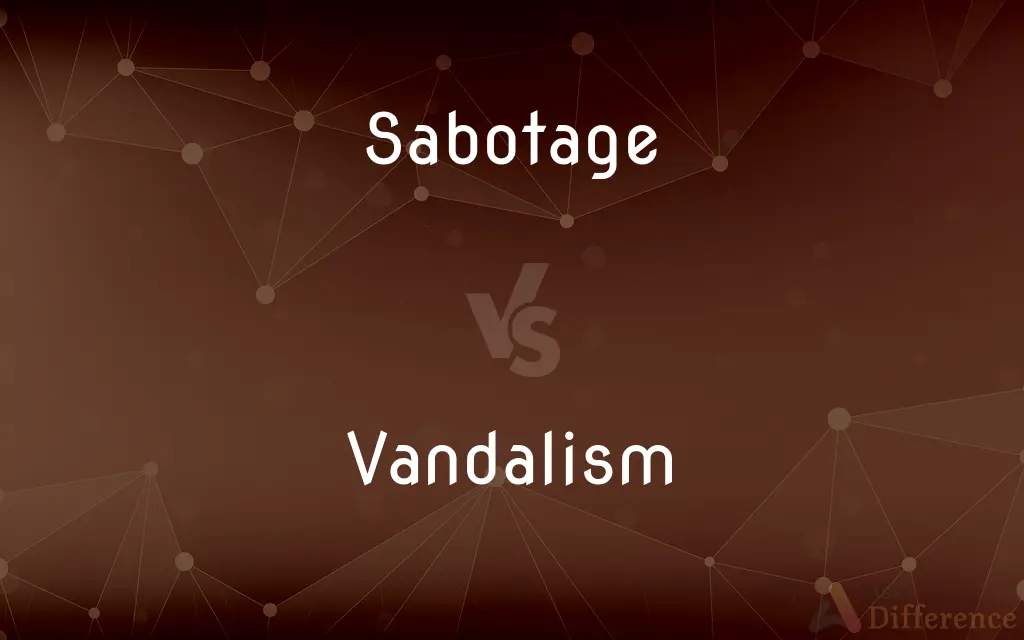Sabotage vs. Vandalism — What's the Difference?
Edited by Tayyaba Rehman — By Urooj Arif — Updated on March 6, 2024
Sabotage is a deliberate action to damage or obstruct, often for a specific cause, while vandalism is the act of destroying or defacing property for no clear motive.

Difference Between Sabotage and Vandalism
Table of Contents
ADVERTISEMENT
Key Differences
Sabotage involves deliberate actions aimed at damaging, disrupting, or obstructing operations, systems, or processes, typically for a specific purpose or cause. It often carries a connotation of stealth and strategy, intended to weaken an adversary or protest against a system. Vandalism, on the other hand, refers to the act of deliberately destroying or defacing public or private property, usually without a specific purpose beyond the act of destruction itself. It is often driven by impulse or a desire to defy social norms.
While sabotage is usually motivated by political, social, or personal objectives, aiming to bring about change or draw attention to a cause, vandalism lacks such strategic intent. Sabotage might target infrastructure, machinery, or technology to disrupt services or operations, making a statement or causing financial loss to those in opposition. Vandalism is more indiscriminate, affecting anything from public buildings and monuments to personal property, often resulting in a sense of community violation without advancing a particular agenda.
The perpetrators of sabotage often possess a deeper understanding of the target's operations or systems, enabling them to inflict maximum disruption with minimal effort. This knowledge is crucial for ensuring their actions have the intended effect, whether it's slowing down production, leaking sensitive information, or creating safety hazards. Vandals, however, do not typically require such detailed knowledge or planning. Their actions are more spontaneous, focusing on immediate and visible damage rather than long-term consequences or strategic impact.
Legal consequences for sabotage can be severe, reflecting its potential to cause significant harm to national security, economic stability, or public safety. Sabotage may be treated as an act of treason, terrorism, or a serious crime against the state, with punishments including long prison sentences. Vandalism, while also illegal, often results in lesser charges, such as misdemeanors or fines, unless the damage is particularly extensive or carries a hate crime enhancement.
Both sabotage and vandalism are disruptive acts, but the former is defined by its purposefulness and strategic nature, often linked to larger goals or conflicts. Vandalism, by contrast, is characterized by its lack of purpose beyond the immediate satisfaction of destruction, reflecting personal discontent or societal defiance rather than a concerted effort to effect change.
ADVERTISEMENT
Comparison Chart
Motivation
Specific cause or objective
Impulse or defiance
Target
Operations, systems, infrastructure
Property (public or private)
Intent
Disruption, damage for strategic effect
Destruction, defacement without clear purpose
Planning
Strategic, informed
Spontaneous, indiscriminate
Legal Consequences
Severe (e.g., treason, terrorism)
Generally less severe (misdemeanors, fines)
Compare with Definitions
Sabotage
Damage or subversion carried out to advance a cause or agenda.
The computer virus was an act of sabotage against the corporation.
Vandalism
Unauthorized destruction or alteration of structures or artwork.
The ancient site suffered vandalism when tourists carved their names into the walls.
Sabotage
Deliberate action aimed at weakening an opponent or effort through damage or obstruction.
The spy was trained in sabotage techniques to disrupt the enemy's communications.
Vandalism
Defacement of property for the sake of damage or rebellion.
Breaking windows and spray painting walls were common forms of vandalism in the area.
Sabotage
An act of undermining or disrupting an endeavor for a specific purpose.
Environmental activists engaged in sabotage to stop the construction of the pipeline.
Vandalism
The practice of marring or spoiling the appearance or usability of something.
Vandalism of the school's property led to increased security measures.
Sabotage
The act of deliberately damaging or destroying resources to impact operations.
The sabotage of the power lines caused widespread blackouts.
Vandalism
The act of deliberately destroying or damaging property without a specific motive.
The park statues were covered in graffiti in an act of vandalism.
Sabotage
Sabotage is a deliberate action aimed at weakening a polity, effort, or organization through subversion, obstruction, disruption, or destruction. One who engages in sabotage is a saboteur.
Vandalism
Actions causing harm to public or private assets without clear objectives.
The abandoned building became a frequent target for vandalism.
Sabotage
The deliberate destruction of property or obstruction of normal operations, as by civilians or enemy agents in a time of war.
Vandalism
Vandalism is the action involving deliberate destruction of or damage to public or private property. The term includes property damage, such as graffiti and defacement directed towards any property without permission of the owner.
Sabotage
The deliberate attempt to damage, destroy, or hinder a cause or activity.
Vandalism
Action involving deliberate destruction of or damage to public or private property
An act of mindless vandalism
Surveillance of the building would reduce vandalism and theft
Sabotage
To damage, destroy, or hinder (something) by sabotage.
Vandalism
Willful or malicious damage or destruction of the property of another.
Sabotage
A deliberate action aimed at weakening someone (or something, a nation, etc) or preventing them from being successful, through subversion, obstruction, disruption, and/or destruction.
Vandalism
Willful damage to or destruction of any property, such as graffiti or defacement.
As we turned down the street I was appalled by the vandalism: spray paint and smashed windows that were everywhere.
Sabotage
To deliberately destroy or damage something in order to prevent it from being successful.
The railway line had been sabotaged by enemy commandos.
Our plans were sabotaged.
Vandalism
The spirit or conduct of the Vandals; ferocious cruelty; hostility to the arts and literature, or willful destruction or defacement of any object of beauty or value.
Sabotage
Scamped work.
Vandalism
Willful wanton and malicious destruction of the property of others
Sabotage
Any surreptitious destruction of property or obstruction of activity by persons not known to be hostile; - in war, such actions carried out behind enemy lines by agents or local sympathisers of the hostile power.
Sabotage
A deliberate act of destruction or disruption in which equipment is damaged
Sabotage
Destroy property or hinder normal operations;
The Resistance sabotaged railroad operations during the war
Sabotage
Intentional disruption to cause failure or hinder success.
Workers committed sabotage to protest against the unfair policies of the factory.
Common Curiosities
Can vandalism ever be considered sabotage?
While typically motivated differently, vandalism can cross into sabotage if it targets specific operations or systems with the intent to disrupt or protest.
What is the main difference between sabotage and vandalism?
The main difference lies in their motivations: sabotage is purpose-driven, often with political or social goals, while vandalism is act-driven, lacking a clear motive beyond destruction.
What drives individuals to commit acts of vandalism?
Motivations can vary, including impulse, a desire for rebellion, boredom, or the intent to defy social norms or authority.
Is sabotage only a physical act, or can it be digital?
Sabotage can also be digital, such as cyber attacks aimed at disrupting services, stealing information, or damaging digital infrastructure.
Can political movements justify acts of sabotage?
Some movements may view sabotage as a legitimate form of protest or resistance, though legality and ethics remain contentious.
What role does social media play in acts of vandalism?
Social media can both incite vandalism by spreading ideas or images that encourage mimicry and help in identifying perpetrators through shared evidence.
Are there any historical examples where sabotage led to significant change?
Yes, throughout history, sabotage has been used as a tactic in warfare, resistance movements, and political protests to effect change or disrupt the status quo.
Can the environmental impact of an action distinguish sabotage from vandalism?
The environmental impact isn't a distinguishing factor on its own, but the intent behind environmental harm can indicate whether an act is sabotage or vandalism.
Are the consequences for sabotage always more severe than for vandalism?
Generally, yes, due to the potential for sabotage to cause widespread harm or disruption, especially to national security or critical infrastructure.
How do authorities differentiate between an act of vandalism and an act of sabotage?
The differentiation is based on the intent, target, and potential impact of the act, with sabotage being more strategic and aimed at specific goals beyond mere destruction.
How do societies prevent sabotage and vandalism?
Prevention can involve security measures, societal engagement, addressing underlying grievances, and promoting community values.
What psychological factors contribute to vandalism?
Factors can include a sense of disenfranchisement, thrill-seeking, peer pressure, or a manifestation of underlying social or personal issues.
How does the perception of sabotage and vandalism differ in various cultures?
Cultural attitudes can influence the interpretation and tolerance of such acts, with some societies being more sympathetic to certain motives than others.
What preventative measures can be effective against both sabotage and vandalism?
Effective measures include security enhancements, community engagement, addressing root causes of discontent, and promoting awareness of the consequences.
How do legal systems around the world view sabotage?
Legal systems typically treat sabotage as a serious crime, especially when it threatens national security, public safety, or critical infrastructure.
Share Your Discovery

Previous Comparison
Lifebuoy vs. Lux
Next Comparison
Crying vs. WiningAuthor Spotlight
Written by
Urooj ArifUrooj is a skilled content writer at Ask Difference, known for her exceptional ability to simplify complex topics into engaging and informative content. With a passion for research and a flair for clear, concise writing, she consistently delivers articles that resonate with our diverse audience.
Edited by
Tayyaba RehmanTayyaba Rehman is a distinguished writer, currently serving as a primary contributor to askdifference.com. As a researcher in semantics and etymology, Tayyaba's passion for the complexity of languages and their distinctions has found a perfect home on the platform. Tayyaba delves into the intricacies of language, distinguishing between commonly confused words and phrases, thereby providing clarity for readers worldwide.














































